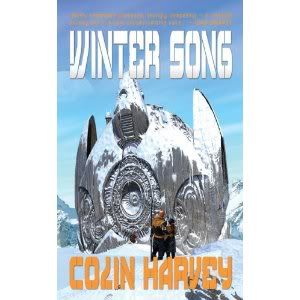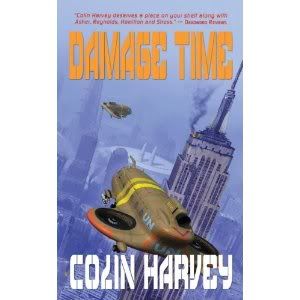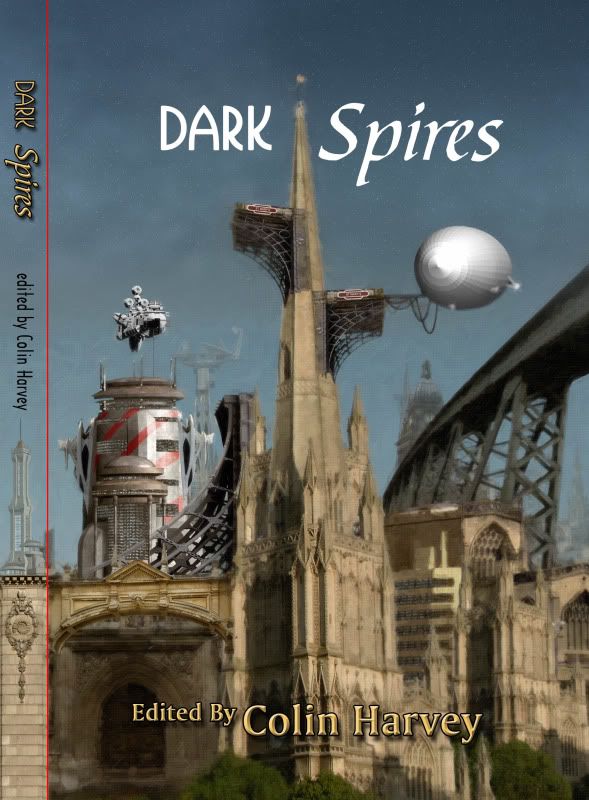Guest Post - Colin Harvey
Something a bit different this morning for the blog. I'm going to hand over the reins to Colin Harvey, author of science fiction novels Winter Song and Damage Time, and editor of Dark Spires, Future Bristol, and Transtories, which is due for release in September 2011 by Aeon Press.

This is what Colin had to say about how novel writing is more of a team effort than people realise, and how when your copy editor tells you to leave out that implausible sex scene, you should really listen!
-Tell us something about you that would surprise us.
Well, I’m a science fiction writer who has gone back to university, doing a creative writing course! While it’s more for scriptwriting and journalism, SF has cropped up on the syllabus. I’ve tended to slide down in my seat and ignore the sniggers from my friends, who think the irony of it is delicious! (And yes, I have learned a couple of things this year, so you can teach an old dog new tricks!)
-Have you ever had the occasion to vehemently disagree with your agent/editor about a change to the MS, and if so, how does that sort of thing get settled?
Generally speaking, a writer isn’t going to win many arguments with their editor, and it’s a waste of time trying, because ultimately we’re all on the same side, trying to make the book as enjoyable as possible. Generally, most disagreements get settled with a bit of give ‘n’ take, but occasionally one side or the other will dig their heels in.
This did happen once, years ago, when Swimming Kangaroo Books were editing Lightning Days (my second novel, published in 2006), and my editor expressed their reservations about a scene in which a happy couple make it into the Mile High Club in the cockpit of a helicopter. For some reason I was very attached to the scene, despite its implausibility. The deadlock lasted for several days, and eventually the publisher had to step in and arbitrate in the editor’s favour, and to settle the argument I cut the whole scene - which I should have done in the first place. But I learned from that to be much more laid back about changes....
-How far/tightly are your stories planned? Do characters ever show up midplot and steal the scene? Do plot developments ever get forgotten-or become much more important than anticipated?
I usually write synopses that are about ten pages long, but even at that length, changes will creep in as the novel progresses. I realized part way through my latest work in progress that one character needed someone else to be a bad guy on his behalf; so I created a thug, and then to round him out a chapter or two later, gave him a few words of backstory. But generally speaking, while characters might steal a scene, showing up mid-plot and ‘stealing’ the story isn’t something I go in for.
Plot developments shouldn’t get forgotten, especially if I’m working from a synopsis. I may, however, deliberately leave things untied, either to create a thread from which to write a successor work.

-I’d love to hear whether you advocate wholesale slaughter in your novels or see it as a sign of weakness? "How To Kill Your Imaginary Friends" is helpful with keeping injuries, death and dismemberment plausible, but sometimes I think they’re unnecessary. What’s the difference between necessary injury/illness/death and a weak attempt to kick start a poorly-thought-out plot?
It really depends on what type of book is involved. A horror novel -say- without bodies is going to be a fairly anaemic story! But while I’m a firm believer in keeping the body count as moderate as can be for the demands of the plot, but there are times when if a writer doesn’t raise the stakes, the reader’s likely to shrug their shoulders and say, “so what?”
So I have absolutely no qualms about raising the body count in my stories to epic levels, but most of the violence will be implied; if you drop an asteroid on a densely populated planet, there are going to be casualties. But what I prefer to do is to pick out one or two people, and give them a moment of recognition.
If a reader is upset at the death of a character, that means the author has done a good job of giving that character their moment, IMHO.
How do you keep the pace and interest going when you also need to showcase your world?
Start a fight!
Joking apart, worldbuilding -and its evil sibling, infodumping- is one of the most critical aspects of writing SF, since no other form of literature requires so much explanation. I generally use two methods.
One method is to keep that ‘showcasing’ to a minimum, and keep it in the background. When we’re talking to people, we don’t stop to explain things. I don’t tell my wife, “I’m typing some words on this small electronic tablet which will travel thousands of miles to other readers connected via similar machines.”
Ideally, the writer will have the character doing things that become self-explanatory through context. David Marusek is one writer who is very good at this. Also, Peter Watt’s Hugo winning ‘The Island’ and its runner-up, Paul Cornell’s ‘One of Our Bastards is Missing,’ are both exemplary models in what I call gingerbreading, that is scattering information throughout the narrative. The reader has to work harder to gain understanding, but I’ve never believed in serving up the literary equivalent of baby-food - bland, processed, all thinking done for the reader.
The other method is to have various levels of conflict going on in the background or foreground, if necessary. This doesn’t have to be all-out fights; it could be an argument about what a husband and wife are having for dinner - local native food, which the husband would find perfectly digestible if only he’d remember to take his anti-toxins, or expensive imported (Terran) food; it could be a (wo)man agonizing over a difficult choice, or even just a vague sense of disquiet.
Generally speaking, a mixture of levels of conflict is good, just as changes of pace are good.
Do you have any non-writing-related projects going on in your life? How do you balance them with each other and with your writing?
I’m not sure about projects so much as life in general.
I have a wife who works and a dog who needs walking, so I do as much of the walking as I can, which helps me think. We split the household chores and cooking, so that if I’m not at uni, I’ll prepare lunch for my wife’s return (unless she’s working late) and from Monday to Thursday, I cook dinner in the evenings. Last weekend I spent emptying compost bins full of rotted down organic matter onto the flower beds.
And as well as writing, I’m studying for that B.A. in Creative Writing that I mentioned earlier, using techniques such as scriptwriting, poetry, narrative non-fiction and other techniques. It’s become such a stretch that I’ve started to keep a spreadsheet, detailing how many hours I’ve spent on writing, blogging, degree work, etc, so that all the subjects get a look in. I tend to find that I work in clusters. When I worked on Damage Time that took the bulk of my attention, but when that was finished, I concentrated on degree work, until the end of term.

With regards to backstory - how much is too much?
This is one of about four different questions that I get asked, which vary only in what the part of the story is to be omitted, be it backstory, ideas, subplots, or the setting (‘world’). I’ll put the four of them together and as best I can as one question, if that’s okay.
Generally speaking, there is one surefire way to remove all extraneous back story, plot, ideas, setting, etc - and that is experience. It’s not a very popular answer, because most people today want quick solutions and shortcuts. But there is no magic bullet. It’s taken me thirteen or fourteen years to get here. It was David Gerrold who said that the first million words are the hardest, and he was right.
One of the ways I can recognize first novels is that even if they are very well structured, they tend to have so many ideas that everything but the kitchen sink has been thrown in. Now, imagine you’ve written your first novel - what’s your second one going to be about? And your third?
My advice to any new writer would be when you finish the draft, think about your second novel; whatever ideas you want to go in -unless the new book is a sequel, or deliberately echoes the first- take as many as you can spare out of the first. Then go back to the first novel. It was Jasper Fforde who told me to ration your ideas. And he was right. Remember your career might last you ten, twenty, thirty years. You’re running a marathon, not a sprint. Generally speaking, while readers love ideas in SF novels, no one counts them, and at novel length, the characters are as important as the ideas and the setting.
The same applies to how much backstory I include. The answer is as little as the reader needs to know: in Winter Song, I crashed a spacer on an icy world. I told the reader only that he was older than the heroine, married to two women and another man, and that his clone-wife was carrying his child, which was expected imminently. Everything else, little as it was, emerged during the story, especially from his actions.
Other writers also play an important part, especially in terms of not getting bogged down and helping with plots and sub-plots. I belong to the Codex group of writers, which is an enormous help - and it’s a good way to make new friends.
Among other things we do for each other is look over stories and novels, and offer suggestions for improvement. It’s a brave (or foolish) writer who doesn’t act on any of those suggestions. I also belong to a second group, who perform the same service for each other. Each draft is critiqued, and those critiques will focus particularly on aspects like pacing, plotting (dead-ends or under development) and language.
Finally, a copyeditor at the publishers will sometimes offer suggestions on macro issues such as those covered above. A lot of work goes into making any published novel as good as it can be, for the simple reason that readers talk about good books and books that are badly edited or laid out - who wants to get a rep for that?
So in terms of what sub-plots, ideas, settings, back-story etc, to omit, any novel much more of a team effort than readers might think. Take a look at the acknowledgements page the next time you pick up a book. Like many other writers, I include my thanks to my helpers, but stress that any flaws are mine. After all, it’s my name on the cover...

Many thanks to Doctor Grasshopper for providing such interesting questions, and to Colin for some fascinating answers. Something to mull over when you're debating which scenes need the chop!
Colin's blog can be found here : http://www.colin-harvey.com/
And you can buy his books on Amazon (co.uk and .com), and then get them signed at BristolCon -
http://www.bristolcon.org
Thank you, Colin!

This is what Colin had to say about how novel writing is more of a team effort than people realise, and how when your copy editor tells you to leave out that implausible sex scene, you should really listen!
-Tell us something about you that would surprise us.
Well, I’m a science fiction writer who has gone back to university, doing a creative writing course! While it’s more for scriptwriting and journalism, SF has cropped up on the syllabus. I’ve tended to slide down in my seat and ignore the sniggers from my friends, who think the irony of it is delicious! (And yes, I have learned a couple of things this year, so you can teach an old dog new tricks!)
-Have you ever had the occasion to vehemently disagree with your agent/editor about a change to the MS, and if so, how does that sort of thing get settled?
Generally speaking, a writer isn’t going to win many arguments with their editor, and it’s a waste of time trying, because ultimately we’re all on the same side, trying to make the book as enjoyable as possible. Generally, most disagreements get settled with a bit of give ‘n’ take, but occasionally one side or the other will dig their heels in.
This did happen once, years ago, when Swimming Kangaroo Books were editing Lightning Days (my second novel, published in 2006), and my editor expressed their reservations about a scene in which a happy couple make it into the Mile High Club in the cockpit of a helicopter. For some reason I was very attached to the scene, despite its implausibility. The deadlock lasted for several days, and eventually the publisher had to step in and arbitrate in the editor’s favour, and to settle the argument I cut the whole scene - which I should have done in the first place. But I learned from that to be much more laid back about changes....
-How far/tightly are your stories planned? Do characters ever show up midplot and steal the scene? Do plot developments ever get forgotten-or become much more important than anticipated?
I usually write synopses that are about ten pages long, but even at that length, changes will creep in as the novel progresses. I realized part way through my latest work in progress that one character needed someone else to be a bad guy on his behalf; so I created a thug, and then to round him out a chapter or two later, gave him a few words of backstory. But generally speaking, while characters might steal a scene, showing up mid-plot and ‘stealing’ the story isn’t something I go in for.
Plot developments shouldn’t get forgotten, especially if I’m working from a synopsis. I may, however, deliberately leave things untied, either to create a thread from which to write a successor work.

-I’d love to hear whether you advocate wholesale slaughter in your novels or see it as a sign of weakness? "How To Kill Your Imaginary Friends" is helpful with keeping injuries, death and dismemberment plausible, but sometimes I think they’re unnecessary. What’s the difference between necessary injury/illness/death and a weak attempt to kick start a poorly-thought-out plot?
It really depends on what type of book is involved. A horror novel -say- without bodies is going to be a fairly anaemic story! But while I’m a firm believer in keeping the body count as moderate as can be for the demands of the plot, but there are times when if a writer doesn’t raise the stakes, the reader’s likely to shrug their shoulders and say, “so what?”
So I have absolutely no qualms about raising the body count in my stories to epic levels, but most of the violence will be implied; if you drop an asteroid on a densely populated planet, there are going to be casualties. But what I prefer to do is to pick out one or two people, and give them a moment of recognition.
If a reader is upset at the death of a character, that means the author has done a good job of giving that character their moment, IMHO.
How do you keep the pace and interest going when you also need to showcase your world?
Start a fight!
Joking apart, worldbuilding -and its evil sibling, infodumping- is one of the most critical aspects of writing SF, since no other form of literature requires so much explanation. I generally use two methods.
One method is to keep that ‘showcasing’ to a minimum, and keep it in the background. When we’re talking to people, we don’t stop to explain things. I don’t tell my wife, “I’m typing some words on this small electronic tablet which will travel thousands of miles to other readers connected via similar machines.”
Ideally, the writer will have the character doing things that become self-explanatory through context. David Marusek is one writer who is very good at this. Also, Peter Watt’s Hugo winning ‘The Island’ and its runner-up, Paul Cornell’s ‘One of Our Bastards is Missing,’ are both exemplary models in what I call gingerbreading, that is scattering information throughout the narrative. The reader has to work harder to gain understanding, but I’ve never believed in serving up the literary equivalent of baby-food - bland, processed, all thinking done for the reader.
The other method is to have various levels of conflict going on in the background or foreground, if necessary. This doesn’t have to be all-out fights; it could be an argument about what a husband and wife are having for dinner - local native food, which the husband would find perfectly digestible if only he’d remember to take his anti-toxins, or expensive imported (Terran) food; it could be a (wo)man agonizing over a difficult choice, or even just a vague sense of disquiet.
Generally speaking, a mixture of levels of conflict is good, just as changes of pace are good.
Do you have any non-writing-related projects going on in your life? How do you balance them with each other and with your writing?
I’m not sure about projects so much as life in general.
I have a wife who works and a dog who needs walking, so I do as much of the walking as I can, which helps me think. We split the household chores and cooking, so that if I’m not at uni, I’ll prepare lunch for my wife’s return (unless she’s working late) and from Monday to Thursday, I cook dinner in the evenings. Last weekend I spent emptying compost bins full of rotted down organic matter onto the flower beds.
And as well as writing, I’m studying for that B.A. in Creative Writing that I mentioned earlier, using techniques such as scriptwriting, poetry, narrative non-fiction and other techniques. It’s become such a stretch that I’ve started to keep a spreadsheet, detailing how many hours I’ve spent on writing, blogging, degree work, etc, so that all the subjects get a look in. I tend to find that I work in clusters. When I worked on Damage Time that took the bulk of my attention, but when that was finished, I concentrated on degree work, until the end of term.

With regards to backstory - how much is too much?
This is one of about four different questions that I get asked, which vary only in what the part of the story is to be omitted, be it backstory, ideas, subplots, or the setting (‘world’). I’ll put the four of them together and as best I can as one question, if that’s okay.
Generally speaking, there is one surefire way to remove all extraneous back story, plot, ideas, setting, etc - and that is experience. It’s not a very popular answer, because most people today want quick solutions and shortcuts. But there is no magic bullet. It’s taken me thirteen or fourteen years to get here. It was David Gerrold who said that the first million words are the hardest, and he was right.
One of the ways I can recognize first novels is that even if they are very well structured, they tend to have so many ideas that everything but the kitchen sink has been thrown in. Now, imagine you’ve written your first novel - what’s your second one going to be about? And your third?
My advice to any new writer would be when you finish the draft, think about your second novel; whatever ideas you want to go in -unless the new book is a sequel, or deliberately echoes the first- take as many as you can spare out of the first. Then go back to the first novel. It was Jasper Fforde who told me to ration your ideas. And he was right. Remember your career might last you ten, twenty, thirty years. You’re running a marathon, not a sprint. Generally speaking, while readers love ideas in SF novels, no one counts them, and at novel length, the characters are as important as the ideas and the setting.
The same applies to how much backstory I include. The answer is as little as the reader needs to know: in Winter Song, I crashed a spacer on an icy world. I told the reader only that he was older than the heroine, married to two women and another man, and that his clone-wife was carrying his child, which was expected imminently. Everything else, little as it was, emerged during the story, especially from his actions.
Other writers also play an important part, especially in terms of not getting bogged down and helping with plots and sub-plots. I belong to the Codex group of writers, which is an enormous help - and it’s a good way to make new friends.
Among other things we do for each other is look over stories and novels, and offer suggestions for improvement. It’s a brave (or foolish) writer who doesn’t act on any of those suggestions. I also belong to a second group, who perform the same service for each other. Each draft is critiqued, and those critiques will focus particularly on aspects like pacing, plotting (dead-ends or under development) and language.
Finally, a copyeditor at the publishers will sometimes offer suggestions on macro issues such as those covered above. A lot of work goes into making any published novel as good as it can be, for the simple reason that readers talk about good books and books that are badly edited or laid out - who wants to get a rep for that?
So in terms of what sub-plots, ideas, settings, back-story etc, to omit, any novel much more of a team effort than readers might think. Take a look at the acknowledgements page the next time you pick up a book. Like many other writers, I include my thanks to my helpers, but stress that any flaws are mine. After all, it’s my name on the cover...

Many thanks to Doctor Grasshopper for providing such interesting questions, and to Colin for some fascinating answers. Something to mull over when you're debating which scenes need the chop!
Colin's blog can be found here : http://www.colin-harvey.com/
And you can buy his books on Amazon (co.uk and .com), and then get them signed at BristolCon -
http://www.bristolcon.org
Thank you, Colin!